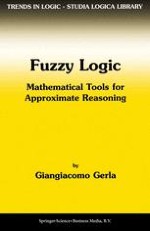
2001 | OriginalPaper | Buchkapitel
Abstract Logic in a Lattice
verfasst von : Giangiacomo Gerla
Erschienen in: Fuzzy Logic
Verlag: Springer Netherlands
Enthalten in: Professional Book Archive
Aktivieren Sie unsere intelligente Suche, um passende Fachinhalte oder Patente zu finden.
Wählen Sie Textabschnitte aus um mit Künstlicher Intelligenz passenden Patente zu finden. powered by
Markieren Sie Textabschnitte, um KI-gestützt weitere passende Inhalte zu finden. powered by
Let S be a nonempty set and denote by P(S) the class of all subsets of S. Then a closure operator in S is any map J : P(S) → P(S) such that, for X, Y ∈ P(S), $$X \subseteq Y \Rightarrow J(x) \subseteq J(Y);X \subseteq J(X);J(J(X)) = J(X)$$ (see, e.g., Cohn [1965]). The theory of closure operators is a powerful and elegant tool for (monotone) logics. Indeed, given any deduction apparatus whose set of well-formed formulas is &1D53D;, we can consider the related deduction operator D: P(F) → P(F), i.e., the operator defined by setting, for any X ∈ P(F), D(X) equal to the set of formulas we can derive from X. Then D is a closure operator. This led several authors to propose a general approach in which an abstract logic is a pair (F, D) where F is the set of formulas in a given language and D a closure operator in F (see Tarski [1956], Brown and Suszko [1973], Wójcicki [1988]). The extension of such an approach to fuzzy logic is straightforward. It is enough to substitute the lattice of all subsets of F with the lattice of all fuzzy subsets of F. This is in accordance with the definition of deduction operator given in Pavelka [1979].